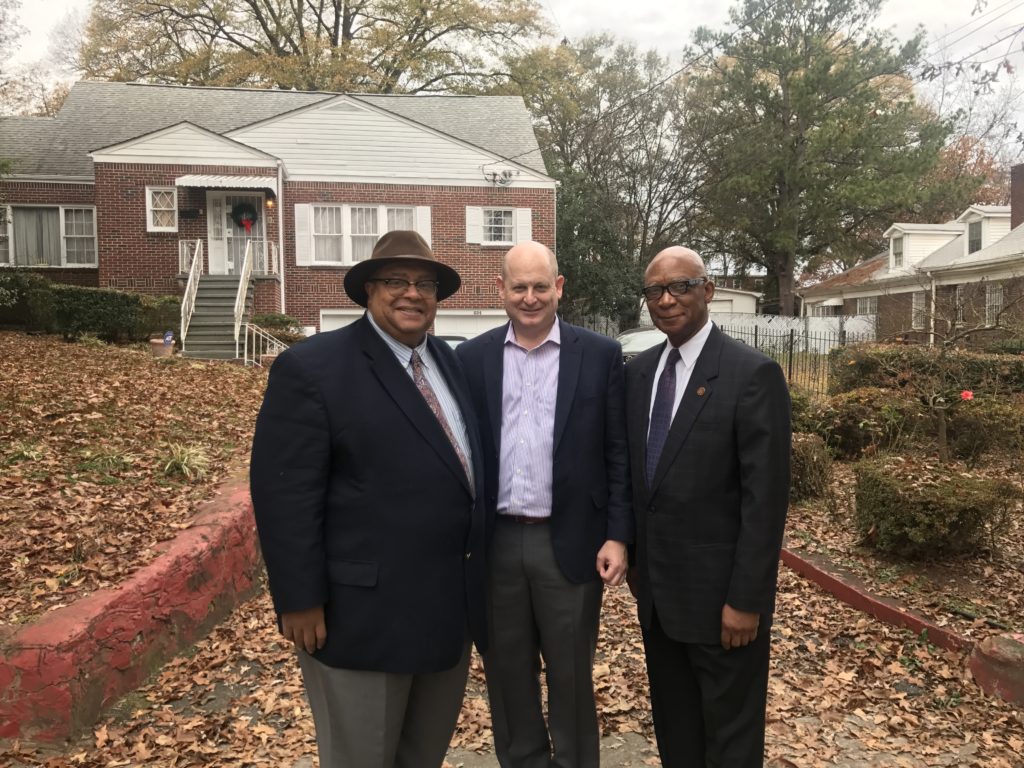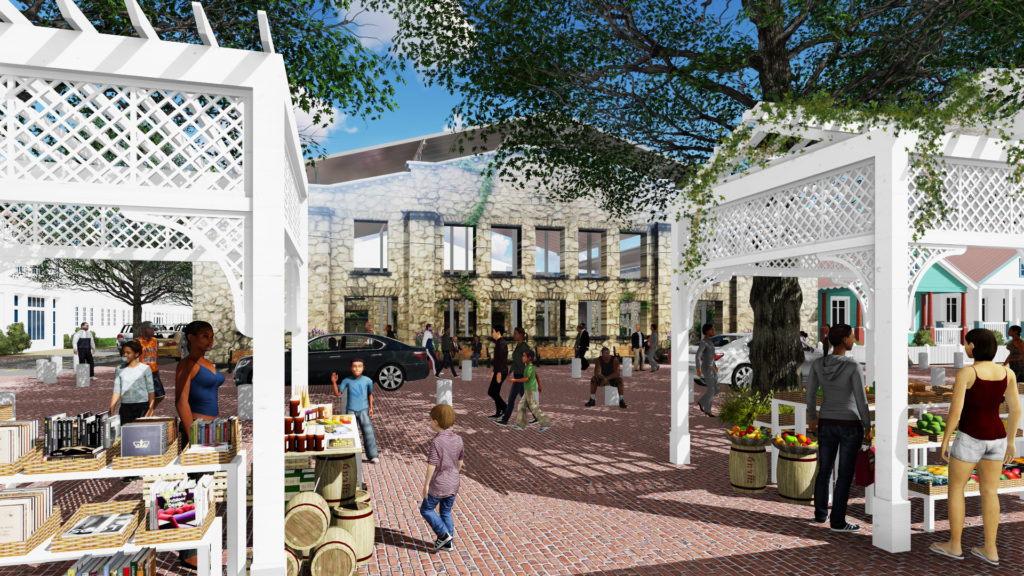News: Atlanta City Council Adopts Westside Land Use Plan
On Monday, Dec. 4, Atlanta City Council made another landmark decision in support of mixed-income growth and community retention on Atlanta’s Historic Westside.
At its final meeting of the year, Council unanimously adopted the Westside Land Use Framework Plan – a design and implementation strategy for the equitable revitalization of the historic Westside neighborhoods of English Avenue, Vine City, Ashview Heights, Atlanta University Center, Booker T. Washington and Just Us – sponsored by Westside Future Fund, City of Atlanta and Chick-fil-A Foundation.
Council’s adoption means the Land Use Framework Plan will now be incorporated into the City’s Comprehensive Development Plan, ensuring its recommendations are factored into future planning decisions.
Since the establishment of the Westside Future Fund in Dec. 2014, the organization has focused on ensuring the historic Westside develops as a mixed-income community, not displacing current residents, while also creating housing options for future residents of all income levels, especially as planned growth and development across the city foreshadow a higher demand for intown real estate.
Westside Future Fund, in partnership with the City of Atlanta, commissioned the plan in 2015 – less than a year after its founding – as one of its first orders of business.
Additional details, including the full announcement and the complete Land Use Framework Plan, can be found below.
- Press Release: Atlanta City Council Adopts Westside Land Use Framework Plan
- Westside Land Use Framework Plan
- Atlanta Business Chronicle Coverage:
“City adopts land-use vision for Westside communities”
(Maria Saporta) - Westside Future Fund Target Area Map
- Press Release: Anti-Displacement Tax Fund
__________________________________________________________________________
News Release (Abbreviated)
Westside Future Fund Announces
Atlanta City Council’s Adoption of Westside Land Use Plan
Adoption Comes Only Weeks After Council Approves
Affordable Housing Legislation –
“two important first steps” for
mixed-income growth on Atlanta’s Historic Westside
ATLANTA – December 8, 2017 – At its last official meeting of the year, Atlanta City Council made another landmark decision in support of mixed-income growth and community retention on Atlanta’s Historic Westside.
Council unanimously adopted the Westside Land Use Framework Plan – a design and implementation strategy for the equitable revitalization of the historic Westside neighborhoods of English Avenue, Vine City, Ashview Heights, Atlanta University Center, Booker T. Washington and Just Us – sponsored by Westside Future Fund, City of Atlanta and Chick-fil-A Foundation.
The plan, which will help guide future developments, was introduced by District 3 Councilmember Ivory Young, longtime resident of the community, and District 4 Councilmember Cleta Winslow. The plan was championed by fellow councilmember and Westside native Michael Julian Bond (Post 1 At-Large).
“As a longtime Westside resident and steward of the community, I am encouraged by the support we received from our City’s leadership to adopt this very important plan, which will serve a catalyst for the revitalization of my entire City Council district,” said Councilmember Young whose district-wide Westside Revive plan includes the Land Use Framework plan.
“The history, culture and people that exist in these neighborhoods cannot afford to be lost or compromised. This plan will allow us to oversee positive change and guide these neighborhoods to become ‘whole’ and vibrant again.”
Westside Future Fund, in partnership with the City of Atlanta, commissioned the plan in 2015 – less than a year after its founding – as one of its first orders of business.

Plan principles include:
- Grounding in best practice and existing community knowledge: Renowned urbanist Dhiru Thadani and Atlanta-based firm APD Urban Planning and Management were hired to lead the project, which coupled best-practice research of other successful and similar community revitalization projects with extensive consideration of how to link past planning efforts.
- The recommendations built upon the 18 previous plans and studies that were completed in the past 15 years, including the City’s most recent Atlanta City Design Project, created by City of Atlanta Planning Commissioner Tim Keane and Atlanta BeltLine visionary Ryan Gravel.
- Robust Community Engagement Process: Community engagement meetings with all neighborhoods were conducted over the course of a year and a half, beginning spring 2016, with each neighborhood providing input on a unique vision statement and goals.
- More than 1,000 stakeholders participated in the process, including all six neighborhood associations and the Atlanta University Center institutions (Morehouse College, Spelman College, Clark Atlanta University, Morris Brown and Morehouse School of Medicine).

- Focused Vision for Resident Retention, Neighborhood Character, Infrastructure and Parks and Open Space:
- Resident retention through the strengthening of neighborhood assets
- Preservation of each neighborhood’s unique identity, including recommendations around the protection of historic structures and sites
- Identification of key infrastructure projects and investment opportunities
- Improvements to quality of life and mobility through increased access to parks, open spaces
 Click here to view additional renderings from the Westside Land Use Framework Plan.
Click here to view additional renderings from the Westside Land Use Framework Plan.
Significant Strides toward Equitable Development
The adoption of the Framework Plan comes just weeks after Council’s unanimous approval of the Mandatory Inclusionary Zoning Legislation, which supports the creation of quality, affordable mixed-income housing – a key component of the plan.
The legislation requires new rental housing developments in BeltLine communities, such as the Historic Westside District, to reserve a percentage for affordable “workforce housing*” units.
Under the law, developers must allocate either 10 percent of its total units for households at 60 percent Area Median Income (AMI)* or below OR 15 percent of its total units for households at 80 percent AMI or below.
“We are extremely grateful for the leadership of Mayor Kasim Reed, Commissioner Tim Keane and his team and Atlanta City Council to ensure that all residents — no matter their background or socioeconomic status — have an opportunity to be part of the tremendous growth and revitalization that’s happening in our city,” said John Ahmann, executive director of the Westside Future Fund.
“These two actions are critical and important first steps, but only the beginning. We must continue to be intentional about creating opportunities for individuals who still find themselves below the current threshold,” Ahmann added.
“As the birthplace of Civil Rights leaders and the adult home of Dr. King, we have great responsibility to carry on their legacy. Westside Future Fund is dedicated to fostering a community they would still be proud to call home. One that is compassionate, inclusive and economically just.”
The inclusionary zoning policy will go into effect on all developments seeking a permit 60 days from the Nov. 7 City Council meeting date.
The Land Use Framework Plan will now be incorporated into the City’s Comprehensive Development Plan, ensuring its recommendations are factored into future planning decisions.
